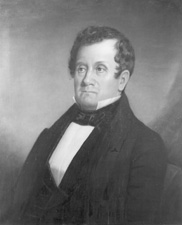John Page (politician, 1787)
John Page (born May 21, 1787 in Haverhill , New Hampshire , † September 8, 1865 ibid) was an American politician and governor of the state of New Hampshire from 1839 to 1842 . Between 1836 and 1837 he represented his state in the US Senate in Washington .
Early years and political advancement
John Page attended local schools in his homeland. After that he worked on his father's farm. During the British-American War he served six months as a lieutenant in the US Army ; while he was used to protect the borders of New Hampshire.
Page's political career began in 1813 when he was first elected to Haverhill Town Council. In this office he then completed 14 consecutive legislative terms. In 1815 he was also employed by the US tax authorities. Between 1818 and 1820 and again in 1835 he was a member of the New Hampshire House of Representatives . Between 1827 and 1835 he was a notary public ( Register of Deeds ) in Grafton County with one interruption in 1828 .
Page in the US Senate
After the resignation of Senator Isaac Hill , who had been elected the new governor of New Hampshire, Page was elected as his successor to the US Senate. There he ended the current Hill legislature as a Class 3 Senator . His time in Congress lasted from June 8, 1836 to March 4, 1837. During that time he was a member of the Agriculture Committee. When he ran for re-election, he was defeated by future President Franklin Pierce .
New Hampshire Governor
In 1839 John Page, who had been a member of the Executive Council of New Hampshire since 1838 , was elected as the Democratic candidate for the new governor of his state. After being re-elected twice, he was able to exercise this office between June 5, 1839 and June 2, 1842. During this time the Debtors Act was changed. From then on, debtors were no longer sentenced to prison terms. Also during Page's tenure, the first geological survey to explore the state's mineral resources was commissioned. Financing for a school for the blind was also secured. With the Webster-Ashburton Treaty in 1841 the border with Canada was finally established and the annexation of the Republic of Indian Stream under Governor William Badger was confirmed.
Another résumé
After the end of his governorship, Page campaigned for the construction of the railway line from Boston via Concord to Montreal . He was also one of the founders of the Republican Party in his state. John Page was still living through the American Civil War . He died in September 1865 and was buried in his hometown of Haverhill. He had nine children with his wife, Hannah Merrill.
literature
- Robert Sobel and John Raimo (Eds.): Biographical Directory of the Governors of the United States, 1789–1978. Volume 3, Meckler Books, Westport, 1978. 4 volumes.
Web links
- John Page in the National Governors Association (English)
- Biography of New Hampshire (English)
- John Page in the Biographical Directory of the United States Congress (English)
- John Page in the database of Find a Grave (English)
| personal data | |
|---|---|
| SURNAME | Page, John |
| BRIEF DESCRIPTION | American politician |
| DATE OF BIRTH | May 21, 1787 |
| PLACE OF BIRTH | Haverhill , New Hampshire |
| DATE OF DEATH | September 8, 1865 |
| Place of death | Haverhill , New Hampshire |


